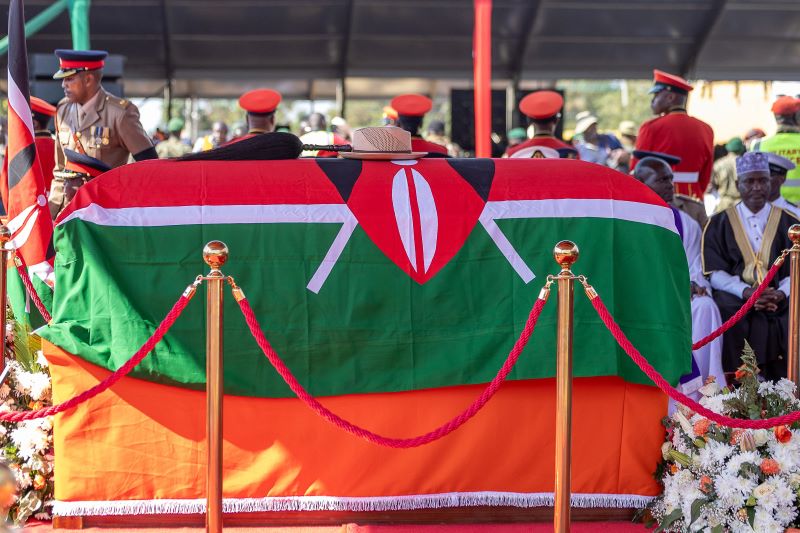Raila was a political engineer, and I was his student- Ruto

Ruto reflected on their long journey through Kenya’s political arena, recalling the 2022 elections, which he described as a contest between teacher and student.
President William Ruto has described the late former Prime Minister Raila Odinga as a visionary strategist, dedicated mentor, and statesman whose contributions have left an enduring mark on Kenya’s political landscape.
Speaking at Raila’s funeral service in Bondo on Sunday, Ruto highlighted that Raila’s brilliance extended beyond his professional career as an engineer to his exceptional skills in political strategy, mentoring a generation of leaders, including himself.
More To Read
- Kenya to build human origins museum and science park in Turkana County
- State unveils Sh5 trillion infrastructure plan, JKIA upgrade and new airport to start in January 2026
- Winnie Odinga dismisses ODM infighting claims, says party united ahead of 2027
- Speaker Kingi submits list of absentee landlord farms to Ruto for squatter resettlement
- President Ruto leads nation in mourning former Lugari MP Cyrus Jirongo
- Ruto honours Benni McCarthy, Harriet Okach for elevating Kenya’s sports profile
“I can confidently say that Raila Odinga was not just an engineer; he was a political engineer,” Ruto said.
“Among his students in political engineering was yours truly, William Ruto. I’m proud that Raila is being laid to rest when one of his own students, a man he mentored, is the President of Kenya.”
The funeral service, held at the Jaramogi Oginga Odinga University of Science and Technology grounds, drew thousands of mourners along with local and international dignitaries who came to pay tribute to the ODM leader.
Ruto reflected on their long journey through Kenya’s political arena, recalling the 2022 elections, which he described as a contest between teacher and student.
“During the 2022 elections, many people were amazed that I was not fearful because it involved Raila and his student,” he said.
“It did not matter to me who would win; either Raila was going to win, or his student was going to win.”
Despite their rivalry, Ruto said they shared common goals for Kenya, including development, democracy, and national unity, noting that their respective coalitions, Kenya Kwanza and Azimio la Umoja, often echoed similar ideals.
“Many wondered how I would defeat Raila, especially after he united with former President Uhuru Kenyatta. But truth be told, even Azimio’s manifesto and ours were similar, because I was his student,” Ruto said.
He lauded Raila’s courage, patriotism, and unwavering commitment, which, he said, will leave a lasting legacy in the nation’s political history.
Reflecting on past collaborations, Ruto spoke of his time with Raila and other Pentagon members at critical moments in Kenya’s history. He recalled never expecting to find themselves on opposing sides and later witnessing Raila supporting efforts to stabilise the country.
“When I stood by him with the other Pentagon members at a defining moment in our nation’s history, I never imagined that one day we would find ourselves on opposite sides nor would I have thought that years later, he would stand by me — this time to steady the nation and help anchor my leadership, culminating in the birth of a broad-based government,” he said.
In March 2025, the two leaders reconciled politically, signing a Memorandum of Understanding to jointly focus on Kenya’s development, acknowledging that the country’s potential had been hindered by ethnic divisions and exclusionary policies.
Ruto also recalled the formation of the Pentagon in 2005, a coalition within the Orange Democratic Movement that opposed the constitutional referendum under the “No” campaign.
The group, which initially included Raila, Ruto, Musalia Mudavadi, Najib Balala, and the late Joe Nyagah, later welcomed Charity Ngilu.
Its goal was to provide ODM with a national outlook by uniting influential leaders from different regions, playing a critical role in mobilising support for the party in the 2007 elections.
Top Stories Today














































